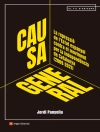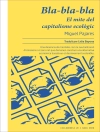A clear and urgent call for the national, social, and individual changes required to prevent catastrophic climate change.
“An iconoclast of the best kind, Stan Cox has an all-too-rare commitment to following arguments wherever they lead, however politically dangerous that turns out to be.”—Naomi Klein, author of On Fire: The (Burning) Case for the New Green Deal
‚Moving to zero net carbon emissions, and fast, is the point of Stan Cox’s important new study, The Green New Deal and Beyond. Cox advocates on behalf of the GND as one step of several we need to take to stabilize the planet.‘—Noam Chomsky, from the book’s foreword
The prospect of a Green New Deal is providing millions of people with a sense of hope, but scientists warn there is little time left to take the actions needed. We are at a critical point, and while the Green New Deal will be a step in the right direction, we need to do more—right now—to avoid catastrophe. In The Green New Deal and Beyond, author and plant scientist Stan Cox explains why we must abolish the use of fossil fuels as soon as possible, and how it can be done. He addresses a host of glaring issues not mentioned in the GND and guides us through visionary, achievable ideas for working toward a solution to the deepening crisis. It’s up to each of us, Cox writes, to play key roles in catalyzing the necessary transformation.
‚A strictly science-based plan for effectively addressing the dire realities of climate change. . . . Convincing, painful, and a long shot—but better than the alternative.‘—Kirkus Reviews
‚His is a warning well worth heeding.‘—Raj Patel, co-author of A History of the World in Seven Cheap Things: A Guide to Capitalism, Nature, and the Future of the Planet
‚In The Green New Deal and Beyond, Stan Cox presents a smart, sane, and plausibly optimistic alternative to abandoning all hope.‘—David Owen, author of Volume Control: Hearing in a Deafening World
‚The teachings of Indigenous Peoples are still here, and it’s up to the present generation to muster the courage and resources to follow those instructions. Stan Cox reminds us of this historic dialogue and development of the Green New Deal, and helps us find the path back to those instructions.’—Winona La Duke (Anishinaabe), author of All Our Relations: Native Struggles for Land and Life and La Duke Chronicles
‚Stan Cox suggests remedies that should ignite lively discussion and intense debate, which is sorely needed. A must-read for those who care about our shared planetary future.’—Mary Evelyn Tucker, Yale School of Forestry and Environmental Studies, co-author, Journey of the Universe
‚An invaluable contribution to what must become an unprecedented international revolution.’—Will Potter, author of Green Is the New Red: An Insider’s Account of a Social Movement Under Siege
‚Cox argues that this is not idealism, but necessity. By 2030 or 2040, if our aims and policies turn out to have been insufficient, as he points out, it will have been too late.‘—Natalie Suzelis, Uneven Earth
‚In this important and readable book, Stan Cox moves the Overton window away from false hope and toward a more realistic path for avoiding climate catastrophe.’—Dr. Peter Kalmus, NASA climate scientist and author of Being the Change
Über den Autor
Stan Cox began his career in the U.S. Department of Agriculture and is now the Lead Scientist at The Land Institute. Cox is the author of Any Way You Slice It: The Past, Present, and Future of Rationing, Losing Our Cool: Uncomfortable Truths About Our Air-Conditioned World (and Finding New Ways to Get Through the Summer) and Sick Planet: Corporate Food and Medicine. His writing about the economic and political roots of the global ecological crisis have appeared in the New York Times, Washington Post, Los Angeles Times, Hartford Courant, Atlanta Journal-Constitution, Baltimore Sun, Denver Post, Kansas City Star, Arizona Republic, The New Republic, The Guardian, Al Jazeera, Salon, and Dissent, and in local publications spanning 43 U.S. states. In 2012, The Atlantic named Cox their ‚Readers‘ Choice Brave Thinker‘ for his critique of air conditioning. He is based in Salina, Kansas.












